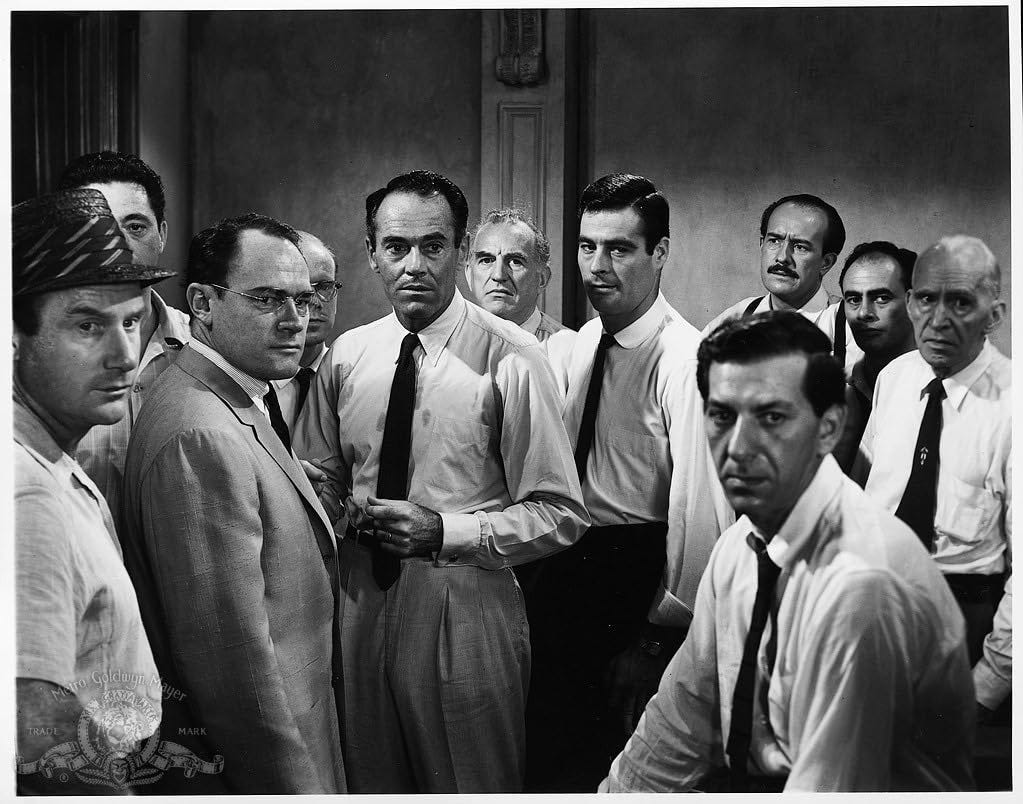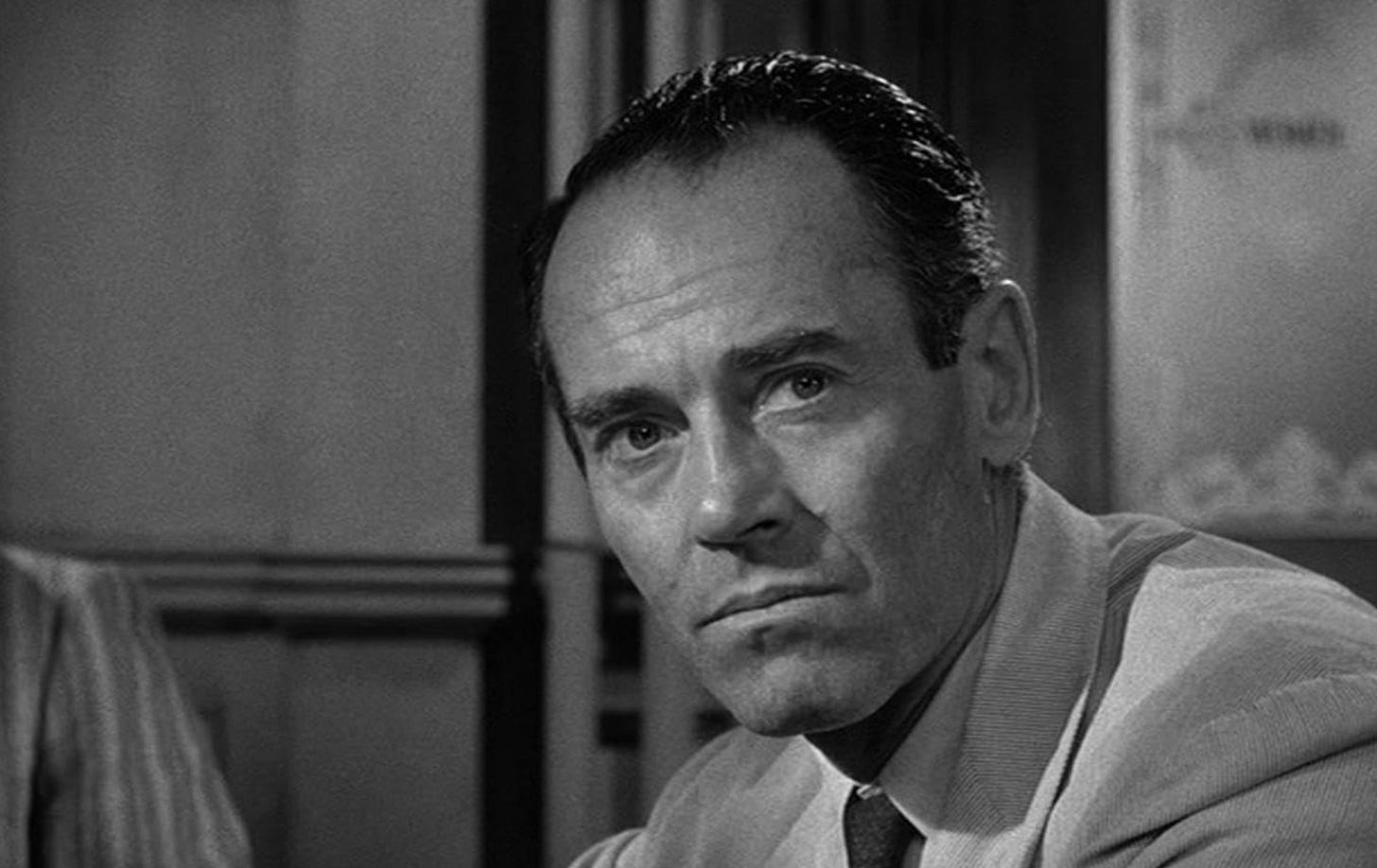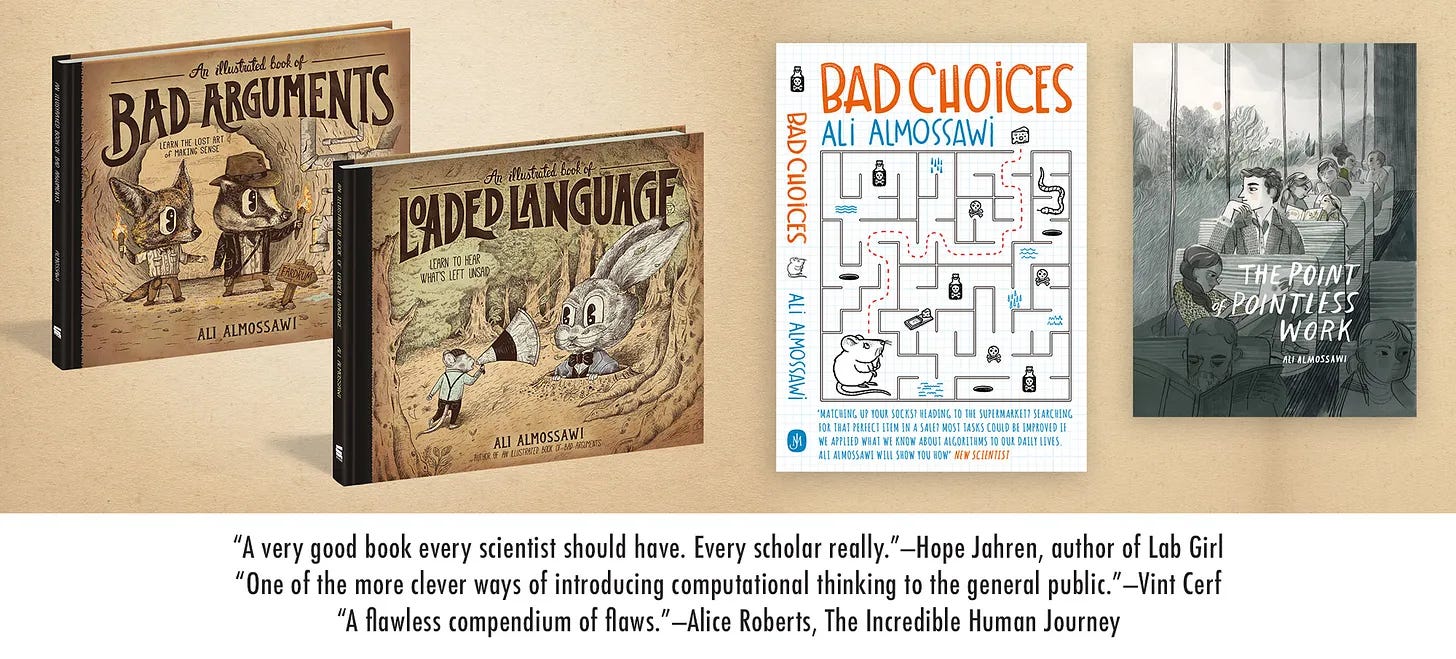12 Angry Men Are Locked In a Room, How Many Logical Errors Do They Make?
A deep-dive into the movie 12 Angry Men. And a look at how one sole voice of reason can affect change in an entire group.
Issue No. 24 🍰
The Critical Thinker is one year old this week. Thanks for sticking around. Founding and paying subscribers, especially, thank you for supporting this little project since the very start. I’m grateful to you all. Happy Fourth of July to US readers.

(This issue contains spoilers from the movie 12 Angry Men.1)
On a scorching day, twelve jurors are locked in a room deliberating the fate of a boy accused of murder in the first degree. By all appearances, it’s an open-and-shut case. The boy stabbed his father, witnesses saw it, the boy was caught. The jury takes a vote—11 vote guilty, one votes not guilty. By the end of the movie, the votes switch to all 12 jurors voting not guilty, including the staunchest hold-outs.
How does a shift like that happen? What factors contribute to a group being swayed one way or the other on some position over the span of a few hours? I was so intrigued the first time I watched the movie 12 Angry Men, I figured it would be useful to do a deep-dive into the various ways the group’s judgments are clouded and ultimately sharpened. Once you’re able to name those tactics, you start seeing them everywhere—the politician on the campaign trail, in a meeting at the office, at the dinner table during a family get-together.
It’s fascinating to see how one person (Juror 8) is able to affect change in the entire group, including the staunchest member of it (Juror 3). Some, he converts early on, others take a little more convincing.

What things clouded the jury’s judgment?
Groupthink
The desire to conform to a group, or to retain our membership in some in-group, can at times discourage us from being a sole contrarian voice. We don’t want to rock the boat, we want to be a team player, we don’t want to be chastised, so we nod along and agree with the loudest voice. Loudness isn’t only a figurative quality, but we see it on display in a literal sense in the movie with one of the jurors whose baseline tone is a scream. Librarians must love him.
The phenomenon is called groupthink, coined by psychologist Irving Janis in 1971. It leads to poor decisions, generally,2 and on safety-critical projects, it can lead to fatal outcomes, like the case of the Challenger space shuttle explosion in 1986.34 Personality (self-confidence) and culture (upbringing) are major factors, of course in making a person liable to it. Then again, not everyone is prone to groupthink, nor cares about it. We see that at the very start of the movie with the lone juror (Juror 8) who votes not guilty, only to receive an immediate quip from another juror,
Boy, oh boy, there’s always one!
It’s a reaction born of contempt for anyone who dares to be different. The lone voice doesn’t care, frankly, and doubles down. Good on him.
Others do care though. One juror (Juror 12) doesn’t speak up when it’s his turn and chooses to pass. Another (Juror 9) only says what he really thinks when the group decides to vote in a secret ballot instead, eliciting an immediate and furious response from someone,
Who was it [who voted not guilty], I want to know!
At a later point, another juror (Juror 11) who voted guilty begins to doubt his decision by asking a series of questions. In response, someone tells him,
Look, you voted guilty, what side are you on?
There you have the appeal to in and out groups. Breaking ranks brings the juror reprimand. You’re supposed to be on our team, he’s essentially told. One of us, not them. Speaking up put him in the out group. There’s nothing in the out-group other than pain and despair … come back in here, where it’s warm and dry, and where tea is served at the top of every hour.
Later on still, we see another peculiar case of groupthink where a juror (Juror 7) only switches from guilty to not guilty when half the jurors have switched too. An appeal to the bandwagon. He’s asked what his reason was for switching and he can’t articulate one. Essentially, so long as most people are voting one way, that’s the way he’ll always vote too.
Trauma
Personal trauma or some personal attachment or fear of a terrible memory repeating itself can bias our thinking. As parents will know, the worse thing to pass onto a child is one’s own trauma. You install into that child something that will only diminish their faculties as they get older. We see that most prominently in the movie with the most belligerent juror (Juror 3) who is the very last person to change his mind.
Early on, as he’s discussing the boy who’s on trial, he takes out a photo of his boy from his wallet and says, bitterly,
I’ve got a kid. When he was eight years old, he ran away from a fight. I saw him. I was so ashamed, I told him right out, “I’m gonna make a man out of you or I’m gonna bust you up into little pieces trying.” When he was fifteen he hit me in the face. He’s big, you know. I haven’t seen him in three years. Rotten kid! You work your heart out.
And then at the very end of the movie, he repeats that same sentiment, right before breaking down into tears in a sudden a moment of release and self-awareness,
Rotten kids, you work your life out!
He then rips the photo of his boy to shreds before falling onto the table and whimpering, “Not guilty … not guilty.” His unresolved personal issue made him stubborn and clouded his judgment. He saw the boy on the stand and he was reminded of his own feelings of guilt. Any feelings of animosity and bitterness toward his own boy, he transferred to this stranger, who had nothing to do with either of them.
Being distracted by how someone says something
We’re often enamored of how someone says something rather than what they’re actually saying. Populist politicians and charismatic business leaders use that to their advantage. It’s not always a nefarious thing, of course. You might be attending a lecture by some intellectual who has your attention gripped for a whole hour, then someone asks you what the talk was about and you go, “Yeah, I’m not quite sure, to be honest.”
It happens a few times among the jurors. One example worth calling out is when at one point, a juror comments that he thinks the boy is guilty because he liked how the prosecutor carried himself. In other words, the prosecutor performed well, therefore his conclusions must also be true.
I thought [the prosecutor] was really sharp. I mean the way he hammered home his points, one by one, in logical sequence. It takes a good brain to do that, I was very impressed...
At another point a juror makes it seem like he’s all being impartial and fair (“Listen, I just want to talk about facts.”) when we know he’s anything but that.
Other times, humor is used to dodge and deflect. One of the jurors in particular dishes out quip after quip, eliciting laughter from fellow jurors.
You keep coming in with these bright sayings ... why don’t you send them to the paper, they pay $3 a piece.
As they like this funny person more, they’re likely to remember his humor more than his position, or conflate him being memorable because he’s funny with memorable because he’s right.
Discomfort
Are you more likely to be thinking clearly when you’re comfortable or when you’re sweaty and sticky? When you’ve got ample free time, or when you’re looking to wrap up the meeting to make it to the ball game in an hour? Throughout the movie, we see the men locked in a room, on the warmest day of the year, profusely sweating, some wanting to be somewhere else. Those conditions no doubt contribute to them wanting to get this thing over with and move on.
Foregone conclusions
You don’t ever want to start from a conclusion and go looking for evidence to support that conclusion. You want to start from doubt and then go looking for evidence to sway you one direction or the other. When Juror 8 says so, he’s met with confident incredulity.
If the disagreeing gentleman can tell us why he thinks [the boy is not guilty], we might be able to show you where you’re mixed up … it’s up to us to convince this gentleman that he’s wrong and we’re right.
That straight away assumes that the one disagreeing voice must be wrong on account of them being alone. So it’s up to everybody else now to take on the burden of educating him. When Juror 9 tries to convince Juror 7 not to be so stubborn, Juror 7 heads to the restroom. Juror 9 tries to go after him, but is prevented by a colleague who gives him the advice,
Juror 9: I’m talking here, you have no right to leave—
Juror 8: He can't hear you. He never will.
Some people, at certain points in time simply can’t be reasoned with. Their minds were made up a long time ago. One of them says so explicitly in fact.
I think the boy is guilty, you won’t change my mind if you talk for a hundred years.
For the jurors whose minds are made up, what are some reasons they give for thinking the boy on trial is guilty?
I just thought he was guilty from the go … I just think he’s guilty … The kid’s a killer, you can see it … he stabbed his own father.
You must have heard variations of that. You ask someone why they think a certain way about someone or some thing and you hear back, “What can I say, that’s just how I feel, man.”
Preconceptions
A form of foregone conclusions that’s worth calling out separately is preconceptions about people. These are molds that we amass over a lifetime and assume are accurate representations of groups of people. And we plop people into them. A huge distraction among some of the jurors is their inability to see the boy as a human being on account of him being from a different community.
He became one of those kids who are always up to no good:
These kids, the way they are nowadays … kids don’t call their fathers Sir anymore.
If it were down to me, I’d slap those kids down before they start any trouble.
You’d believe this kid, knowing what he is? I’ve lived among them all my life, you can’t believe a word they say, you know that … they’re born liars.
You’re letting him slip through our fingers.
These people are dangerous.
Who aren’t entitled to things:
What do you think that trial cost? He’s lucky he got it.
What is this, love-your-underprivileged-brother week or something?
The kids who crawl out of [slums] are real trash.
Who don’t talk like us:
He’s a common ignorant slob, he don’t even speak good English. (The irony, I know.)
They’re all alike, they come over here running for their life, and before they can take a deep breath they’re telling us how to run the show, huh?
Preconceptions work the other way too. One juror assumes lawyers must be infallible, and is disabused of that notion by another juror.
One juror: When [lawyers] don’t ask questions, it’s because they already know the answers.
Another juror: It’s also possible for lawyers to be plain stupid, no?
Preconceptions distort our thinking. As Juror 8 says at one point,
It’s very hard to keep personal prejudice out of a thing like this. And no matter where you run into it, prejudice obscures the truth.
Personal attacks
When we attack the person rather than discuss the issue, our focus shifts to poking holes in the person’s credibility. They become the issue. There’s plenty of that in the movie. For instance,
Come on, this isn’t Sunday, we don’t need a sermon.
You’re a pretty smart fella, aren’t ya.
Don’t be so sensitive.
Calm down, will ya.
Often accompanied by screaming. Someone brings up a good point, and rather than engaging with that point, a person resorts to personal attacks.
Misdirection
When a person can’t deal with an uncomfortable argument, they might resort to misdirection. For instance,
One juror: Supposing we’re wrong [about the boy being guilty?]
Another juror: Suppose this whole building falls down on my head, you can suppose anything.
That shuts down the debate right there. True, you can suppose anything. But one kind of supposing is relevant to the issue at hand (is the boy guilty?) and one kind of supposing is a hypothetical that has no bearing on the issue.
How did Juror 8 change people’s minds?
He made it easier for others to speak up. In an attempt to see if others also secretly shared his reservations about the boy, Juror 8 suggests the group hold a secret ballot. He offers to abstain, and proposes everyone else cast their vote, and if it’s unanimous, he’ll go along with it. And sure enough, eliminating the pressure of having to speak up leads to one other person in the group voting not guilty. It’s a pragmatic move to give people the courage to break out of that psychological barrier of worrying about what others in the group think of them.
He visualized the problem so people could see it. One way to get people to see your perspective is to help them visualize it. Either by replaying an event, role-playing it, or asking people to humor you and do a thought experiment that lets them step into someone else’s shoes. That’s one technique Juror 8 uses in the movie to great effect to convert some of his fellow jurors. To get them, for instance, to see that the old man who took the witness stand couldn’t possibly have walked the distance he said he walked in 15 seconds, he simulates walking that distance in the old man’s state. The room quickly realizes Juror 8 is right. It’s just not possible.
He involved others. When Juror 8 asks others for their inputs while he’s making an impassioned argument, he’s effectively giving them a sense of ownership. For instance, at one point he asks the group how long they think it takes a train to pass a certain point. One person says 12 seconds, another says 10 seconds. All of a sudden, they have skin in the game. He could have said 10 seconds himself and carried on, but by involving others, he more effectively rallies people to his side.
He focuses on changing one person at a time. Juror 8 spends most of the movie speaking to the group. But every now and again, he’ll look at one person in the eyes and ask, “And what do you think?” That immediately creates a rapport between one human and another, particularly of that other person feels disconnected from the group. All of a sudden, here’s this person who is looking straight at them and asking for their—and only their—opinion on something. It’s empowering.
He lets them say the quiet part out loud. Near the end of the movie, one of the jurors who’d been dropping hints about how much he despised the boy and his community goes ballistic and delivers a vile diatribe. By the end of it, everyone in the room is disgusted. As is the juror at himself. He sits in the corner, clearly remorseful about what he just let loose. Saying something out loud can clarify it in our minds. I’m a big believer in talking to ourselves.
He maneuvers a stubborn person into contradicting himself. Juror 8 uses a brilliant technique to wear down the most belligerent of his colleagues. He gets him to contradict himself publicly. He starts a line of questioning, the other juror—in the perpetually emotional state that he’s in—answers, and then mid-answer realizes he just contradicted a position he’d passionately held earlier.
For instance, one juror outright believes a witness who testified seeing the boy kill his father. So Juror 8 asks him,
I like to ask you something, you don’t believe the boy’s story, how come you believe the woman’s? She’s one of them too, isn’t she?
The man gets riled up, but it does plant a seed in his head.
Similarly, with another juror, who insists an old man who took the witness stand was definitely right about hearing the boy shout “I’m going to kill you”, killing his father, and then running down the stairs and out the building.
Juror 8: I’d like to find out if an old man … can get from his bedroom to his front door in 15 seconds.
Juror 3: [The old man] said 20 seconds.
Juror 8: He said 15.
Juror 3: How does he know how long 15 seconds is. You can’t judge a thing like that. He was an old man, half the time he was confused, how can he be positive about anything?
And the camera does a close-up on the juror’s face and you see him start to get rattled.
The long and short of it
There are some things that can make it hard to think clearly. Being in a group of confident, loud voices is one of them. Two big takeaways for me from the movie are that, one, loud doesn’t mean right. And, two, it’s possible for a sole voice of reason to affect change in an entire group.
Someone said to me: You have wakened not out of sleep, but into a prior dream, and that dream lies within another, and so on, to infinity … The path that you are to take is endless, and you will die before you have truly awakened.
—Jorge Luis Borges (The Writing of the God)*
Until next time,
Ali
* He never kept it light, did he, ol’ Jorge.
The script: https://thescriptlab.com/wp-content/uploads/scripts/12AngryMen.pdf
https://www.researchgate.net/publication/273109291_Irving_L_Janis'_Victims_of_Groupthink, https://psycnet.apa.org/record/1975-29417-000
https://www.google.com/books/edition/The_Challenger_Launch_Decision/6f6LrdOXO6wC?hl=en&gbpv=0
There’s also this documentary I once watched. I found a clip of it online: youtu.be/8mCKhj6oU60









Such a great movie and a great analysis of it! Thanks!
Verrassend goede analyse. Dankjewel.